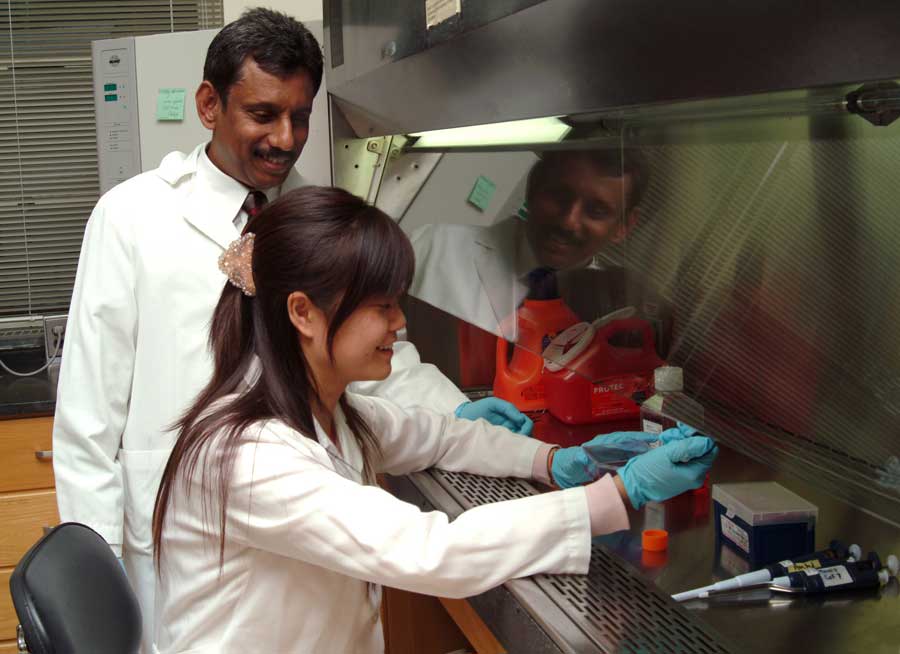Veterinary scientists explore poultry virus approach to human prostate cancer

Virologists in the Virginia-Maryland Regional College of Veterinary Medicine (VMRCVM) at Virginia Tech are looking at how a genetically modified variant of Avian Newcastle disease virus (NDV) can treat human prostate cancer.
Dr. Elankumaran Subbiah, assistant professor, Department of Biomedical Sciences and Pathobiology, was recently awarded a prestigious research grant by the Department of Defense. This “Congressionally Directed Medical Research Program” award will support the exploration and hypothesis development for an innovative approach to treating prostate cancer.
Subbiah and his co-investigator, Dr. Siba K. Samal, associate dean, University of Maryland campus, received a $113,250 grant for their ongoing work using a genetically modified version of NDV to treat prostate cancer in humans.
Prostate cancer is the second most common type of cancer in men, according to the American Cancer Society (ACS). The ACS estimates there will be almost 219,000 new cases of prostate cancer reported in the United States in 2007.
According to Subbiah, the use of poultry viruses as cancer therapy poses no threat to humans and several other oncolytic viruses are currently being explored to treat cancer. However, Subbiah’s work is the first to alter Newcastle disease virus through a reverse genetic system to target prostate cancer specifically.
Reverse genetics is the process of generating a recombinant virus from cloned complimentary DNA (cDNA) copy of a viral genome, explains Subbiah. Through the reverse genetics system, recombinant viruses can be designed to have specific properties that make them attractive as biotechnological tools, live vaccines, and cancer therapeutics. This is achieved through the introduction of the desired changes in the cDNA, which are then transferred faithfully to the recombinant virus.
In the current investigation, Subbiah and his associates are altering the fusion protein of NDV to replicate only in the presence of prostate specific antigen (PSA), which is found exclusively in cancerous prostate cells.
Normal, healthy cells have an interferon antiviral system that activates upon infection with NDV thereby preventing replication of the virus, explains Dr. Subbiah. Cancer cells, however, have defective interferon antiviral systems, he said. NDV utilizes the defects to replicate in the diseased cells. The replication of NDV leads to the death of the cancer cell by a process called apoptosis - also known as programmed cell death or cell suicide- in the cell.
Subbiah received a B.V.Sc. degree, a M.V.Sc. degree and a Ph.D. from the Madras Veterinary College in Madras, India. He was a research assistant professor at the VMRCVM’s University of Maryland-College Park campus prior to joining Virginia Tech in 2006.
In 2000, he was a finalist for the Invention of the Year Award in Life Sciences for his work on dermal immunization of chickens with a unique plasmid DNA.
The Virginia-Maryland Regional College of Veterinary Medicine (VMRCVM) is a two-state, three-campus professional school operated by the land-grant universities of Virginia Tech in Blacksburg and the University of Maryland at College Park. Its flagship facilities, based at Virginia Tech, include the Veterinary Teaching Hospital, which treats more than 40,000 animals annually. Other campuses include the Marion duPont Scott Equine Medical Center in Leesburg, Va., and the Avrum Gudelsky Veterinary Center at College Park, home of the Center for Government and Corporate Veterinary Medicine. The VMRCVM annually enrolls approximately 500 Doctor of Veterinary Medicine and graduate students, is a leading biomedical and clinical research center, and provides professional continuing education services for veterinarians practicing throughout the two states. Virginia Tech, the most comprehensive university in Virginia, is dedicated to quality, innovation, and results to the commonwealth, the nation, and the world.



.jpg.transform/m-medium/image.jpg)
